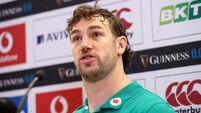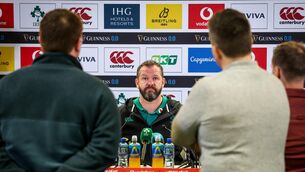Ronan O'Gara: Forget the World Cup. It’s all-in for the spring spectacular

MEN IN BLACK: Left to right, Italy head coach Kieran Crowley, Scotland equivalent Gregor Townsend, Ireland's Andy Farrell, Fabien Galthié of France, new England head coach Steve Borthwick and returning Wales boss Warren Gatland.
THERE can’t be many tournaments in world sport where perceptions and momentum change with the same weekly frequency as the Six Nations. In assessing the respective rounds, one can be made to look stupid on Monday morning after one game. The shifting sands from early February to mid-March could mould an entirely new sub-continent.
SIX NATIONS CHAMPIONSHIP
Your home for the latest news, views and analysis of this year's Six Nations Championship from our award winning sports team.
SIX NATIONS CHAMPIONSHIP
Your home for the latest news, views and analysis of this year's Six Nations Championship from our award winning sports team.













